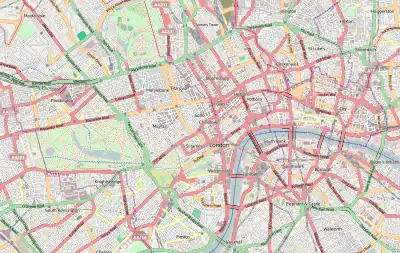Corn Exchange, London
The Corn Exchange was a commercial building in Mark Lane, London, England. The original structure dated from 1747, but the exchange later amalgamated with a rival exchange and was rebuilt several times before finally closing in 1987.
| Corn Exchange, London | |
|---|---|
.jpg.webp) The new Corn Exchange, completed in 1828 | |
| Location | Mark Lane, London |
| Coordinates | 51.5103°N 0.0801°W |
| Built | 1828 |
| Architect | George Smith |
| Architectural style(s) | Greek Revival style |
 Shown in Central London | |
History
.jpg.webp)
In the mid-18th century corn mercants sought a location to trade their corn, which was brought by river into the city, and customarily landed at Bear Quay.[1]
The first corn exchange, known simply as the Corn Exchange, was designed by George Dance the Elder in the neoclassical style, built in ashlar stone and was completed on the east side of Mark Lane in 1747. It brought together the various agents who sold oats, beans and all kinds of grain on behalf of the farmers and was built around a courtyard which was open to the sky.[2] The courtyard was surrounded by stalls or counters at which samples of the goods being traded were available. Either side of the corn exchange were coffee-houses, where further business was transacted.[3]
In 1826 a group of discontented traders sought to establish a rival corn exchange, to be known as the London Corn Exchange.[4] Permission having been granted by Parliament, they established their new corn exchange, also in Mark Lane, immediately to the north of the old corn exchange. The new building was designed by George Smith in the Greek Revival style, built in ashlar stone at a cost of £90,000 and was completed in 1828.[5] The design involved a symmetrical main frontage of nine bays facing onto Mark Lane with the end bays slightly projected forward. The central section of seven bays featured a hexastyle portico formed by Doric order columns supporting an entablature, a frieze decorated by paterae, a cornice and a parapet. At the centre of the parapet there was a large commemorative stone inscribed with the words "Corn Exchange, Erected 1828, By Command of Parliament".[4]
Corn merchants trading at the corn exchanges were required to make daily returns to the comptroller of corn returns for the purposes of paying duties.[6] The volume of corn traded at the corn exchanges grew rapidly after the repeal of the Corn Laws in 1846.[7] The old corn exchange was largely demolished and replaced by a far larger building designed by Edward I'Anson in the Italianate style and completed in 1882.[4]
The use of the buildings as corn exchanges declined significantly in the wake of the Great Depression of British Agriculture in the late 19th century.[8] Both exchanges continued in operation until they were amalgamated in 1926.[4] An "Annual Pelting Rag" during which traders pelted each other in riotous fashion was held each year until 1929, when a trader was killed at Mark Lane and the tradition was abandoned.[9]
Smith's new corn exchange was demolished in 1931; meanwhile, I'Anson's 1882 corn exchange was destroyed in 1941 during the Blitz in the Second World War. Its replacement, designed by Terence Heysham, was funded in part by the commercial letting of an eight-storey office block built as part of the design, and was officially opened by the Minister of Food, Gwilym Lloyd George, on 27 July 1953.[10] It too was demolished and rebuilt in 1973; but the corn exchange continued trading "cereals of every kind, pulse vegetables, flour, seeds, animal feeds and fertilisers".[1]
After several years' decline in trading the corn exchange building on Mark Lane closed in 1987; at the same time the market, and its remaining traders, relocated to the Baltic Exchange in St Mary Axe.[4] However, the name "Corn Exchange" was preserved in the name of the building at numbers 55–56, Mark Lane, which was redeveloped by British Land and completed in 1996.[11][12]
See also
References
- Halliday, Stephen (2014). London's Markets: From Smithfield to Portobello Road. The History Press. ISBN 978-0752497396.
- Bradley, Simon; Pevsner, Nikolaus (1997). The Buildings of England: London 1 - The City of London. New Haven and London: Yale. p. 554. ISBN 978-0300096248.
- The Leisure Hour. Religious Tract Society. 1856. Retrieved 23 May 2023.
- "Corn Exchange Company Ltd". London Metropolitan Archives. City of London. Retrieved 8 February 2017.
- The mnemonic chronology of British history. Hamilton, Adams and Company. 1849. p. 92.
- Burn, Richard (1836). The Justice of the Peace and Parish Officer. Vol. 1. T. Cadell.
- Sheppard, Francis Henry Wollaston (1971). London, 1808–1870: The Infernal Wen. University of California Press. p. 188. ISBN 978-0520018471.
- Fletcher, T. W. (1973). 'The Great Depression of English Agriculture 1873-1896' in British Agriculture 1875-1914. London: Methuen. p. 31. ISBN 978-1136581182.
- Foster, Anthony M. "A Brief History of Hitchin Markets and Fairs" (PDF). Hitchin Historical Society. p. 13.
- George Broomhall's Corn Trade News. Vol. 206. 1953. p. 44.
- "The Corn Exchange, 55–56 Mark Lane". Loop.net. Retrieved 23 May 2023.
- "Barings backs Hao Tian's 55 Mark Lane acquisition with £83m loan". Real Assets IPE. 4 June 2018. Retrieved 23 May 2023.